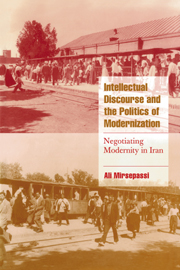Book contents
- Frontmatter
- Contents
- Acknowledgments
- Introduction: modernity and “culture”
- 1 Western narratives of modernity
- 2 Reconciling with the West's Other
- 3 The crisis of secularism and the rise of political Islam
- 4 Islam as a modernizing ideology: Al-e Ahmad and Shari'ati
- 5 German intellectuals and the culture of modernity
- 6 The tragedy of the Iranian Left
- 7 Modernities of our time
- Notes
- Bibliography
- Index
4 - Islam as a modernizing ideology: Al-e Ahmad and Shari'ati
Published online by Cambridge University Press: 06 October 2009
- Frontmatter
- Contents
- Acknowledgments
- Introduction: modernity and “culture”
- 1 Western narratives of modernity
- 2 Reconciling with the West's Other
- 3 The crisis of secularism and the rise of political Islam
- 4 Islam as a modernizing ideology: Al-e Ahmad and Shari'ati
- 5 German intellectuals and the culture of modernity
- 6 The tragedy of the Iranian Left
- 7 Modernities of our time
- Notes
- Bibliography
- Index
Summary
Introduction
In this chapter I will discuss the discourse of authenticity through close examination of the works of Jalal Al-e Ahmad and Ali Shari'ati, two of the most influential intellectuals in the Iranian politics of the last half century. Both Al-e Ahmad and Shari'ati played major roles in the effort to articulate a local, Islamic modernity as a blueprint for revolutionary social change.
For Al-e Ahmad, this effort is sparked by disillusionment with the socialist Tudeh Party's capitulation to Soviet demands. Al-e Ahmad articulates a powerful critique of the hegemonic power of the West centered around the concept of “Westoxication” (Gharbzadegi). This critique attacks Iranian secular intellectuals as complicit in Western power, and incapable of effectively constructing an authentically Iranian modernity. Al-e Ahmad argues that a “return” to an “authentic” Islamic culture is necessary if Iran is to avoid the homogenizing and alienating forces of socio-technological modernization. Yet, the “return” advocated by Al-e Ahmad was a rather complicated political discourse. Ahmad's populist Islam would not reject modernization as such, but would seek to reimagine modernity in accordance with Iranian–Islamic tradition, symbolism, and identities.
Ali Shari'ati continues and extends Al-e Ahmad's critique by articulating a positive theory of Islamic ideology as a modernizing force. Convinced of the necessity of an ideological basis in the struggle for Iranian national liberation, Shari'ati draws liberally from Marxism to construct a populist and activist Islam. Shari'ati urges “good” Muslims to overthrow the corrupt social order, an idea which resonated with Iranian students and youth. Shari'ati's discourse does not seek to uphold binaries between East/West, but to foster a dialogue between the two in order to articulate a viable modernity.
- Type
- Chapter
- Information
- Intellectual Discourse and the Politics of ModernizationNegotiating Modernity in Iran, pp. 96 - 128Publisher: Cambridge University PressPrint publication year: 2000



